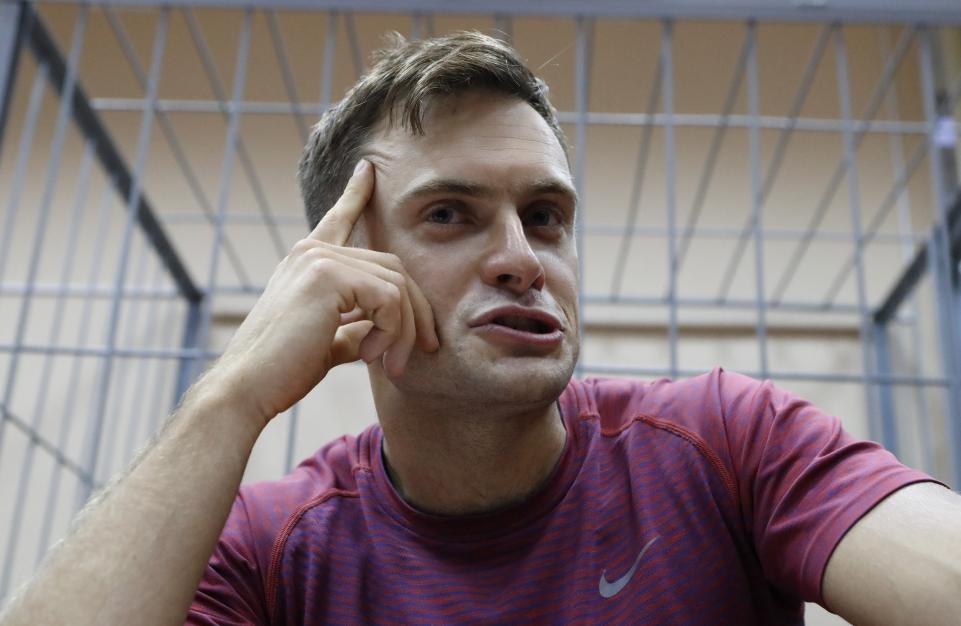dpa: After more than two weeks in hospital, how do you feel?
Verzilov: Compared with last week, I would say, very, very good. For the better part of last week, I was just completely unconscious. In those rare moments that I had a bit of consciousness, I was remembering strange things that didn't fall into one picture. By the end of last week, my consciousness slowly started getting back to me.
dpa: So you didn't know in the beginning where you were, in Berlin or in Moscow? You can't remember the flight?
Verzilov: No.
dpa: Do you have any idea how that could have happened?
Verzilov: We think that since my condition started to drastically get worse on September 11 around 7 or 8 pm - it started with me losing my eyesight, and other problems with coordination - we think it might have happened at some point during September 11.
dpa: You had been in a court building?
Verzilov: Yes. Friends were going through a court hearing, and we were waiting for them for the whole day to finish the procedure.
dpa: So you have no idea how you could have been poisoned? Was there an injection or anything?
Verzilov: I don't think there was an injection because there was no chance to inject anything. But it probably was some sort of liquid nerve agent.
dpa: You assume that the Russian secret service was behind it?
Verzilov: Yes. The doctors were saying that with all the symptoms, the way everything works, it's not understandable for them. It's something very unusual. Obviously there are few organizations in the world that are able to produce and implement [something like this].
dpa: Was it two or three days before you regained consciousness?
Verzilov: After I was moved to Berlin, I think, two more days passed and then I was starting to get the full picture.
dpa: Can you remember what you thought in the beginning when you regained consciousness?
Verzilov: I was asking very fragmented questions, like about my cat. I was calling the boss of Charite [hospital] a prison warden. So it was just random things, floating up from the bottom of [my] mind.
dpa: It's hard to imagine how it must feel to have been poisoned. How has this been for you?
Verzilov: We've been working with opposition politics in Russia for a decade, so you just get used to it. ... We're planning to get some things done in Berlin, then go back to Moscow to continue our work.
dpa: Don't you think it's a bit risky?
Verzilov: Again, doing opposition politics in Russia is quite risky. One of my closest friends, Alexei Navalny, the leader of Russia's opposition, has been spending almost half of his year, every year for the past several years, in administrative detention. He organizes high-profile rallies with tens of thousands of people, and the government tries to stop that somehow, so it's kind of a game of cat and mouse.
dpa: But you're risking your life?
Verzilov: Yes, that's something you have to do, I guess.
dpa: Would you like to be a hero?
Verzilov: No. If you look at how various revolutionary movements have started and achieved their success, like with Nelson Mandela, if you feel the desire and the ability and the strength to do opposition politics in Russia, you just do it. It's definitely not a job for everyone.
dpa: You think the Russian secret service had in mind that you knew about some journalists in Africa?
Verzilov: One of the three [Russian] journalists killed in [the Central African Republic] in late July was my close friend, Russian documentary filmmaker Alexander Rastorguev. We have started our own investigation ... to see what happened there.
dpa: You have been arrested more than once?
Verzilov: Definitely yes.
dpa: How did they treat you in prison?
Verzilov: Towards activists or politicians with a high profile, the prison conditions are quite okay. They're much worse for ordinary citizens, who don't get what they're supposed to by the rules. For any prison boss, someone like me or Navalny is a nightmare because he suddenly has to remember the rules and do as is written.
dpa: What are you planning to do now in Berlin?
Verzilov: We have some tests at Charite [hospital] that still have to be made because they're working on the conclusion to understand what's been happening with the nerve agent.
dpa: Do you have a special project when you return?
Verzilov: Yes, we'll be definitely working on the Central African Republic one and other artistic projects and film projects. One them is a film that I've been working on for the past several months together with Alexander Rastorguev, who was murdered.
dpa: If you go out, you have protection with you?
Verzilov: Yes.
dpa: And in Moscow, too?
Verzilov: In Moscow, no. In Moscow it's useless to have protection because if they want to do something to you, they'll still do it, no matter how many bodyguards you have.
-------------------------------------------------------------------------------------------------------------------
Verzilov: Compared with last week, I would say, very, very good. For the better part of last week, I was just completely unconscious. In those rare moments that I had a bit of consciousness, I was remembering strange things that didn't fall into one picture. By the end of last week, my consciousness slowly started getting back to me.
dpa: So you didn't know in the beginning where you were, in Berlin or in Moscow? You can't remember the flight?
Verzilov: No.
dpa: Do you have any idea how that could have happened?
Verzilov: We think that since my condition started to drastically get worse on September 11 around 7 or 8 pm - it started with me losing my eyesight, and other problems with coordination - we think it might have happened at some point during September 11.
dpa: You had been in a court building?
Verzilov: Yes. Friends were going through a court hearing, and we were waiting for them for the whole day to finish the procedure.
dpa: So you have no idea how you could have been poisoned? Was there an injection or anything?
Verzilov: I don't think there was an injection because there was no chance to inject anything. But it probably was some sort of liquid nerve agent.
dpa: You assume that the Russian secret service was behind it?
Verzilov: Yes. The doctors were saying that with all the symptoms, the way everything works, it's not understandable for them. It's something very unusual. Obviously there are few organizations in the world that are able to produce and implement [something like this].
dpa: Was it two or three days before you regained consciousness?
Verzilov: After I was moved to Berlin, I think, two more days passed and then I was starting to get the full picture.
dpa: Can you remember what you thought in the beginning when you regained consciousness?
Verzilov: I was asking very fragmented questions, like about my cat. I was calling the boss of Charite [hospital] a prison warden. So it was just random things, floating up from the bottom of [my] mind.
dpa: It's hard to imagine how it must feel to have been poisoned. How has this been for you?
Verzilov: We've been working with opposition politics in Russia for a decade, so you just get used to it. ... We're planning to get some things done in Berlin, then go back to Moscow to continue our work.
dpa: Don't you think it's a bit risky?
Verzilov: Again, doing opposition politics in Russia is quite risky. One of my closest friends, Alexei Navalny, the leader of Russia's opposition, has been spending almost half of his year, every year for the past several years, in administrative detention. He organizes high-profile rallies with tens of thousands of people, and the government tries to stop that somehow, so it's kind of a game of cat and mouse.
dpa: But you're risking your life?
Verzilov: Yes, that's something you have to do, I guess.
dpa: Would you like to be a hero?
Verzilov: No. If you look at how various revolutionary movements have started and achieved their success, like with Nelson Mandela, if you feel the desire and the ability and the strength to do opposition politics in Russia, you just do it. It's definitely not a job for everyone.
dpa: You think the Russian secret service had in mind that you knew about some journalists in Africa?
Verzilov: One of the three [Russian] journalists killed in [the Central African Republic] in late July was my close friend, Russian documentary filmmaker Alexander Rastorguev. We have started our own investigation ... to see what happened there.
dpa: You have been arrested more than once?
Verzilov: Definitely yes.
dpa: How did they treat you in prison?
Verzilov: Towards activists or politicians with a high profile, the prison conditions are quite okay. They're much worse for ordinary citizens, who don't get what they're supposed to by the rules. For any prison boss, someone like me or Navalny is a nightmare because he suddenly has to remember the rules and do as is written.
dpa: What are you planning to do now in Berlin?
Verzilov: We have some tests at Charite [hospital] that still have to be made because they're working on the conclusion to understand what's been happening with the nerve agent.
dpa: Do you have a special project when you return?
Verzilov: Yes, we'll be definitely working on the Central African Republic one and other artistic projects and film projects. One them is a film that I've been working on for the past several months together with Alexander Rastorguev, who was murdered.
dpa: If you go out, you have protection with you?
Verzilov: Yes.
dpa: And in Moscow, too?
Verzilov: In Moscow, no. In Moscow it's useless to have protection because if they want to do something to you, they'll still do it, no matter how many bodyguards you have.
-------------------------------------------------------------------------------------------------------------------









 Home
Home Politics
Politics











